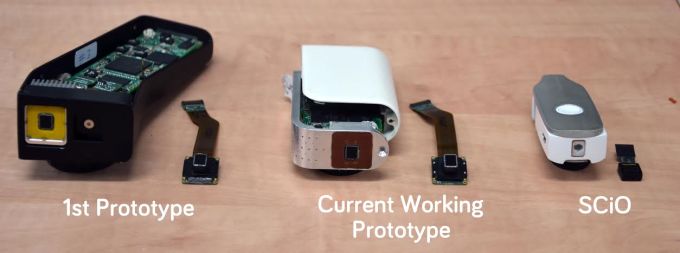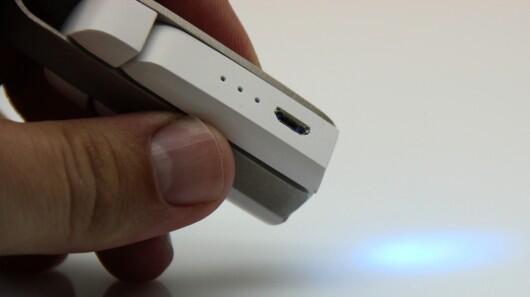Dror Sharon, the CEO of ConsumerPhysics, was showing off a prototype of his handheld “food scanner” at TechCrunch Disrupt NY’s Hardware Alley this week, called the SCiO. The device is a pocket-sized spectrometer that analyzes the molecular structure of an object by first shining a light on the item in question, then identifying the food based on its unique wavelength’s signature. What makes the product interesting are its cost and size; it’s cheaper and smaller than most spectrometers on the market today.
That makes it affordable to consumers who could potentially use something like this to scan food to help determine its caloric content or to see if a pill was real or counterfeit, for example.
To use the device, you press a button that causes a near-infrared light to shine on the sample. An accompanying Bluetooth-connected app then takes the data and compares it to a cloud-based database to analyze the content and send data back to the user’s phone.

The Tel Aviv-based startup’s science is plausible, as spectrometer technology currently exists and can do what this device already does. The technological leap that SCiO claims – something they’ve been working on for three years – is that they’ve miniaturized the spectrometer using lower-cost optics combined with advanced signal processing algorithms.
In doing so, it’s possible that the SCiO has sacrificed sensitivity for size, some believe.
 That’s hard to tell from the demos given at Hardware Alley, since they used some pretty basic foods during like apples, tomatoes, and blocks of cheese (which it could read even through plastic wrap, we should point out). The app would ID the food and return the basic caloric and sugars info fairly quickly. Whether the SCiO would be able to truly and accurately determine a food’s quality or ripeness, for example, as their Kickstarter project page claims, would require further testing.
That’s hard to tell from the demos given at Hardware Alley, since they used some pretty basic foods during like apples, tomatoes, and blocks of cheese (which it could read even through plastic wrap, we should point out). The app would ID the food and return the basic caloric and sugars info fairly quickly. Whether the SCiO would be able to truly and accurately determine a food’s quality or ripeness, for example, as their Kickstarter project page claims, would require further testing.
But the company has been benefitting from the buzz around its Kickstarter launch, where the project has now topped over $1 million in funding – going well over its $200,000 goal.
Even Sharon was surprised, he admitted, saying that he thought the SCiO would only appeal to hardware hackers and tech geeks. The funding, though, proves otherwise. Pocket-sized, Star Trek-like tricorders are on the way, it seems.
Dos Owls ODIN
